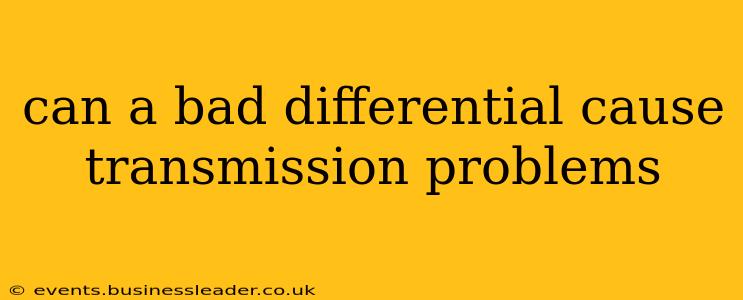Can a Bad Differential Cause Transmission Problems?
A failing differential can certainly indirectly cause problems that might be mistaken for transmission issues, but it rarely causes direct transmission damage. The transmission and differential are separate components, but they work together as part of a vehicle's drivetrain, making it easy to confuse symptoms. Let's explore this further.
What is a Differential and How Does it Work?
Before diving into the potential for problems, understanding the differential's function is crucial. The differential is a gear system located in the rear axle (or sometimes the front axle, or both in all-wheel-drive vehicles). Its job is to allow the wheels to rotate at different speeds when cornering. When a car turns, the outside wheels travel a greater distance than the inside wheels. The differential makes this possible by allowing the axle shafts to spin at different rates.
How Can a Bad Differential Mimic Transmission Problems?
A malfunctioning differential can manifest in several ways that often overlap with transmission problems:
-
Unusual Noises: A failing differential might produce whining, grinding, clicking, or humming sounds, particularly during acceleration, turning, or deceleration. These noises are often mistaken for transmission issues because both components create noise when stressed.
-
Vibration: A damaged differential can cause vibrations throughout the vehicle, especially under load or when cornering. Again, this is also a common symptom of transmission problems.
-
Difficulty Shifting: While not a direct cause, a severely damaged differential might put extra strain on the drivetrain, leading to difficulty shifting or slipping. This is an indirect effect, as the transmission itself isn't failing, but the excessive stress from the faulty differential can make it harder for the transmission to function smoothly.
-
Loss of Power: A significant problem with the differential, such as a broken axle or a completely seized differential, can result in a loss of power to the wheels. This might be mistaken for a problem with the transmission, although the transmission would likely be able to turn the input shaft and engage normally even with a fully-locked differential.
What are the Differences Between Differential and Transmission Problems?
While the symptoms can overlap, some key differences can help pinpoint the problem:
-
Context of the Noise/Vibration: Transmission problems often manifest under various driving conditions, whereas differential problems tend to be more pronounced during turning and cornering.
-
Location of Noise: While both can produce noise, differentials usually produce noises coming from the rear (or front) axle area, whereas transmission problems are often felt and heard coming from underneath the car, closer to the engine.
-
Specific Symptoms: Transmission problems often involve slipping, erratic shifting, or the inability to shift into gear, whereas differential problems are often characterized by noise, vibration, and potential wheel-related issues (like one wheel spinning while the other remains stationary under load).
Can a Bad Differential Damage the Transmission?
It's unlikely a bad differential will directly damage the transmission. However, prolonged operation with a severely damaged differential can put excessive stress on the entire drivetrain, potentially leading to premature wear and tear on the transmission or other components. Think of it like forcing a transmission to do too much work because of an additional burden.
When to Seek Professional Help
If you suspect a problem with either your differential or transmission, it's best to seek the help of a qualified mechanic. Misdiagnosis can lead to further damage and costly repairs. A professional can properly diagnose the issue, ensuring the correct repair is made.
